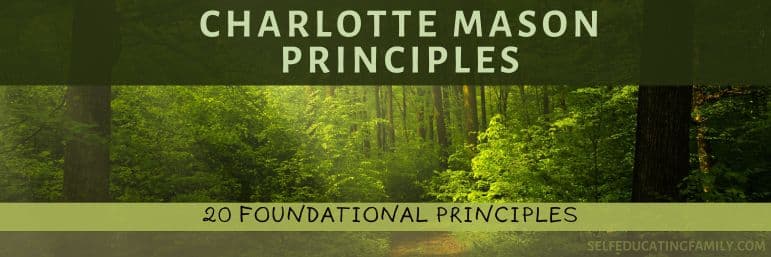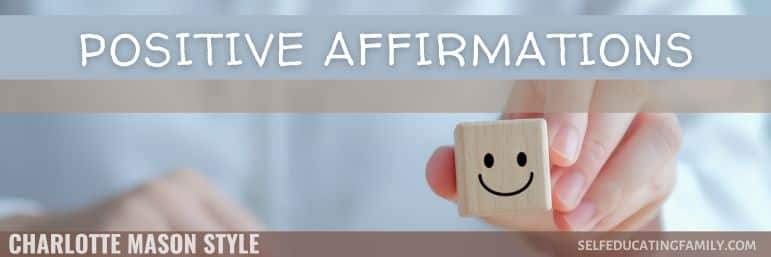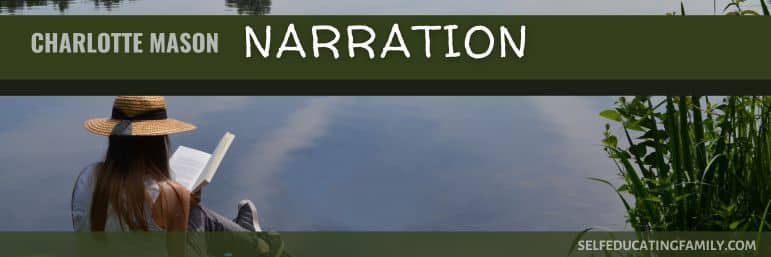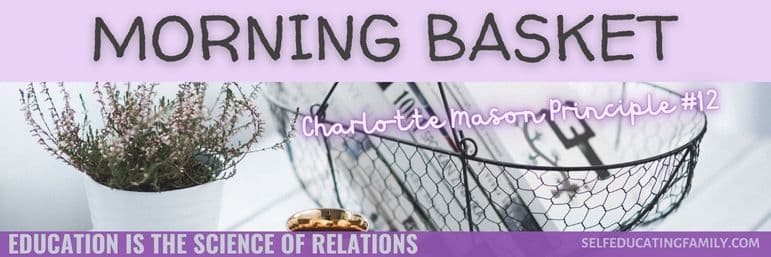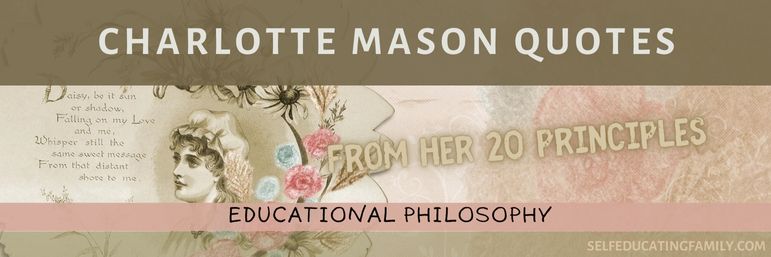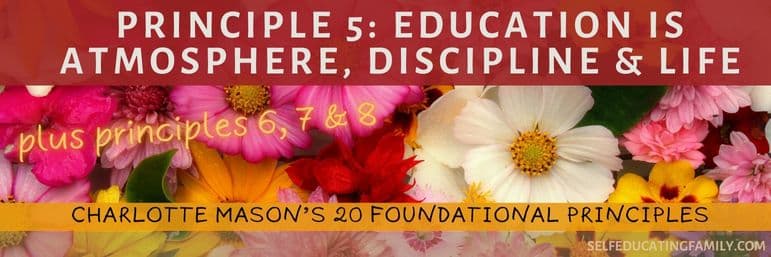What’s Inside: A look at the 20 Charlotte Mason Principles which are the underlying foundation for Charlotte Mason’s method of homeschooling. Using these principles can be extremely practical today, especially for homeschooling families who would like to raise self-learners.
This post may contain affiliate links. If you find my content valuable and make a purchase through one of my links, I will earn a commission at no cost to you, which helps me keep this blog going so I can help you even more! I recommend products I trust and/or use myself, and all opinions I express are my own. Read the full disclaimer here.
Charlotte Mason’s 20 Principles of Education
I’m about to do a series on Charlotte Mason (CM) Principles. This article will simply list the 20 principles and give a brief overview. The articles are posted on the 20 Principles page and go into more detail on each principle.
Where are Charlotte Mason’s 20 Principles?
Each Volume in the Home Education Series by Charlotte Mason begins with the list of these 20 principles. Interestingly, Volume 6 of Home Education expands the final count to 20 from only 18 in the first volume.
Free download PDF
You can download a copy of the principles here for your reference if you don’t have a copy of her books.
Additionally, the public domain texts of Volume 1 and Volume 6 are available on Project Gutenburg. And you can also find a nice annotated version of all of the volumes free for personal use at Ambleside Online.
Why look at these 20 Principles by Charlotte Mason?
While CM wrote in the 1880s, her educational methods are extremely practical today, especially for homeschooling families who would like to raise self-learners.
These principles are the underlying foundation for the Charlotte Mason method of homeschooling.
So we will look at them and see how and why they can help your homeschool day.
Starting the discussion
First, this post will include the complete text in order to start the discussion.
The biggest problem with her writings is that CM wrote in the 1880s! The EIGHTEEN eighties. Not only is that a long time ago, but the English language has changed considerably. lol.
So, for now, accept these 20 principles from Charlotte Mason. And we will look at them in depth as we go. In modern English. Or closer to it at any rate.
“A Short Synopsis”
Charlotte Mason gives a “short synopsis” of her educational philosophy. And the Synopsis starts out with a quote by Whichcote. I couldn’t even get past the first quote without looking something up. Who is Whichcote?
Turns out, Benjamin Whichcote was an English theologian (1606-1683). He led the Cambridge Platonists which contrasted the Puritans, especially in the belief that people are not as completely depraved as the Puritans thought. You’ll see how this comes into play as we look at the principles by Charlotte Mason.
No sooner doth the truth … come into the soul’s sight, but the soul knows her to be her first and old acquaintance… The consequence of truth is great; therefore the judgment of it must not be negligent.”
— WHICHCOTE
Charlotte Mason’s 20 Principles
**Please note: These 20 items are direct quotes from Charlotte Mason. I added headings and pictures to make it more readable.
Children are Persons
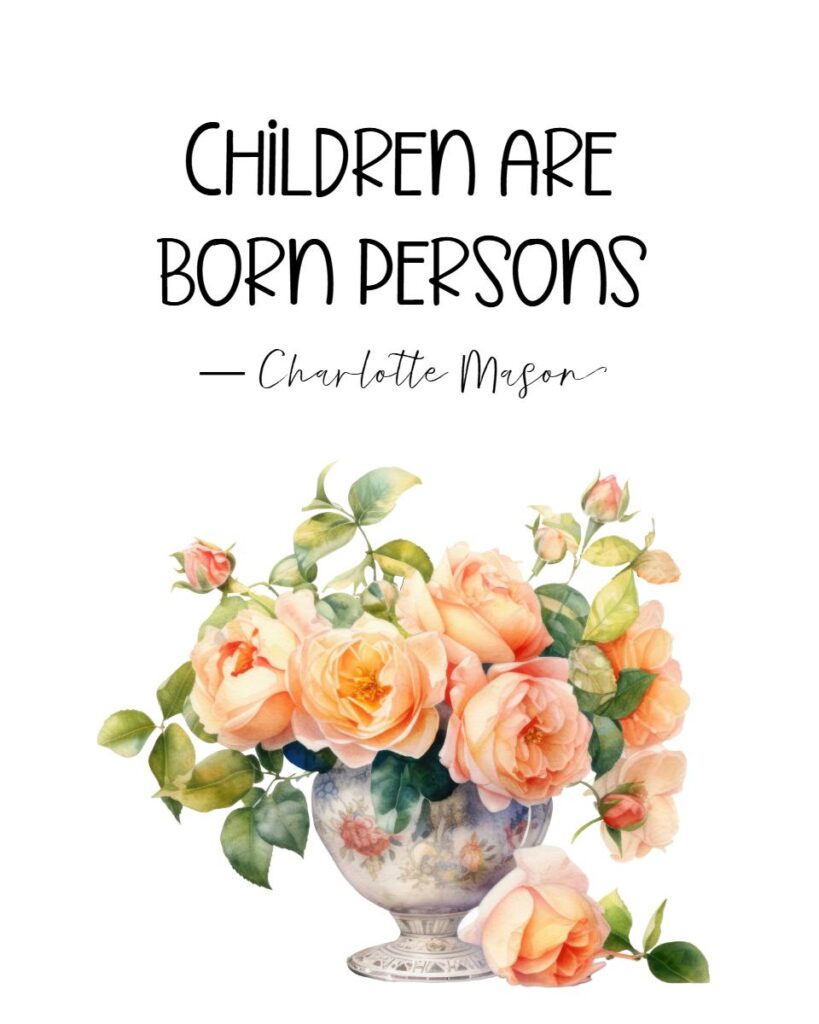
2. They are not born either good or bad, but with possibilities for good and for evil.
3. The principles of authority on the one hand, and of obedience on the other, are natural, necessary and fundamental; but—
4. These principles are limited by the respect due to the personality of children, which must not be encroached upon, whether by the direct use of fear or love, suggestion or influence, or by undue play upon any one natural desire.
5. Therefore, we are limited to three educational instruments—the atmosphere of environment, the discipline of habit, and the presentation of living ideas. The P.N.E.U. Motto is: “Education is an atmosphere, a discipline, and a life.”

6. When we say that “education is an atmosphere,” we do not mean that a child should be isolated in what may be called a ‘child-environment’ especially adapted and prepared, but that we should take into account the educational value of his natural home atmosphere, both as regards persons and things, and should let him live freely among his proper conditions. It stultifies a child to bring down his world to the ‘child’s’ level.
7. By “education is a discipline,” we mean the discipline of habits, formed definitely and thoughtfully, whether habits of mind or body. Physiologists tell us of the adaptation of brain structures to habitual lines of thought, i.e., to our habits.
8. In saying that “education is a life,” the need of intellectual and moral as well as of physical sustenance is implied. The mind feeds on ideas, and therefore children should have a generous curriculum.
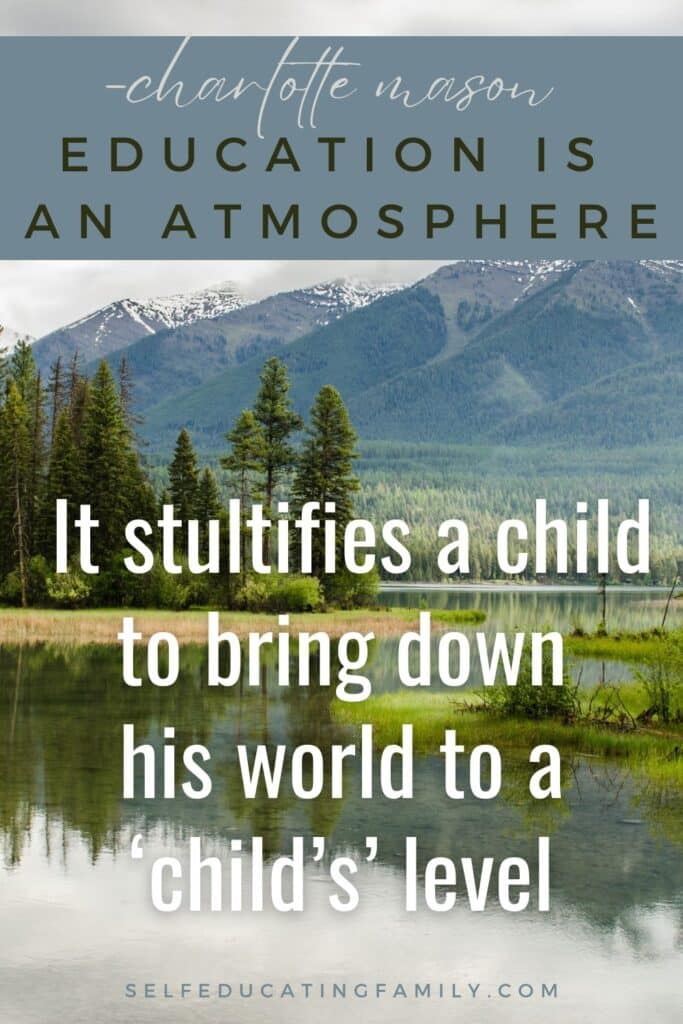
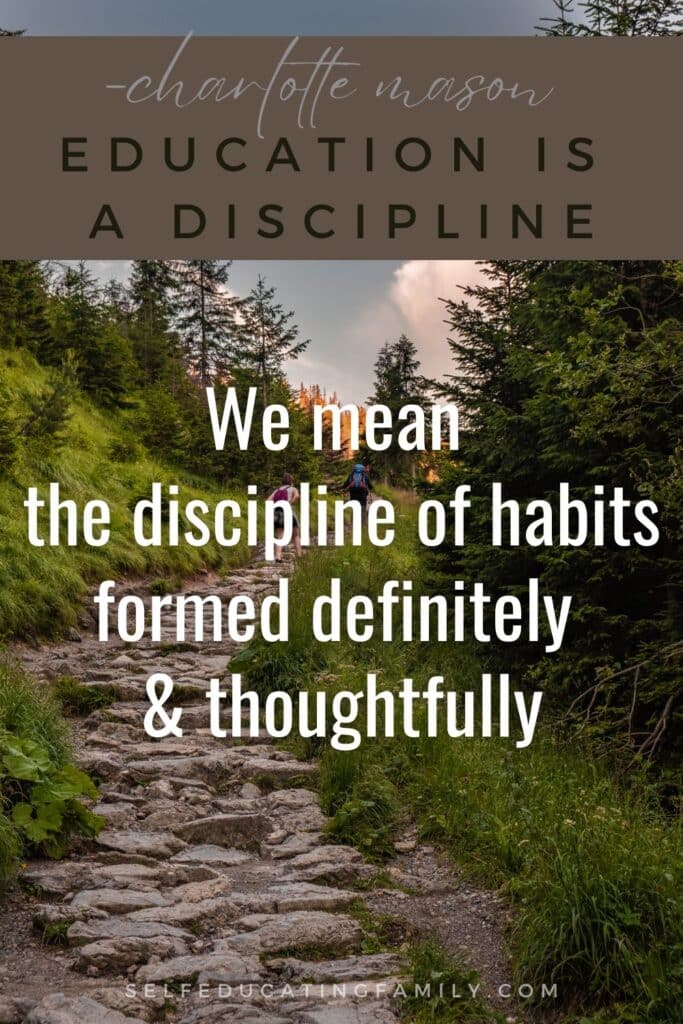
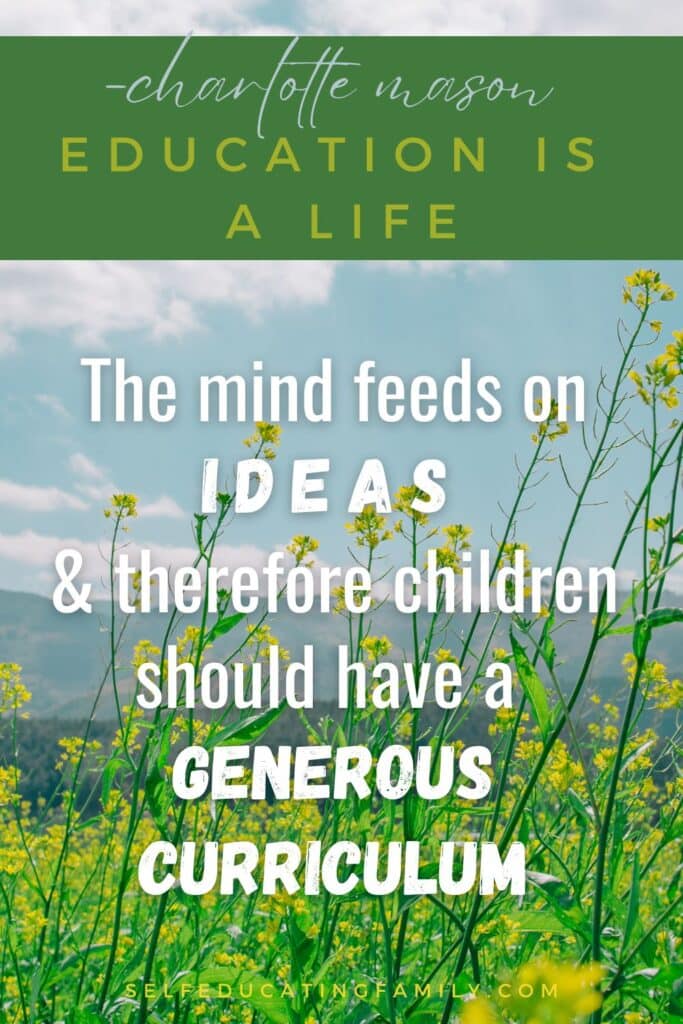
Proper Diet
9. We hold that the child’s mind is no mere sac to hold ideas; but is rather, if the figure may be allowed, a spiritual organism, with an appetite for all knowledge. This is its proper diet, with which it is prepared to deal; and which it can digest and assimilate as the body does food-stuffs.
10. Such a doctrine as e.g. the Herbartian, that the mind is a receptacle, lays the stress of Education (the preparation of knowledge in enticing morsels duly ordered) upon the teacher. Children taught on this principle are in danger of receiving much teaching with little knowledge; and the teacher’s axiom is “what a child learns matters less than how he learns it.”
11. But we, believing that the normal child has powers of mind which fit him to deal with all knowledge proper to him, give him a full and generous curriculum; taking care only that all knowledge offered him is vital, that is, that facts are not presented without their informing ideas. Out of this conception comes our principle that,—
Science of Relations
12. “Education is the Science of Relations”; that is, that a child has natural relations with a vast number of things and thoughts: so we train him upon physical exercises, nature lore, handicrafts, science and art, and upon many living books, for we know that our business is not to teach him all about anything, but to help him to make valid as many as may be of—
“Those first-born affinities
That fit our new existence to existing things.”
13. In devising a Syllabus for a normal child, of whatever social class, three points must be considered:—
(a) He requires much knowledge, for the mind needs sufficient food as much as does the body.
(b) The knowledge should be various, for sameness in mental diet does not create appetite (i.e., curiosity).
(c) Knowledge should be communicated in well-chosen language, because his attention responds naturally to what is conveyed in literary form.
Telling Back
14. As knowledge is not assimilated until it is reproduced, children should ‘tell back’ after a single reading or hearing: or should write on some part of what they have read.
15. A single reading is insisted on, because children have naturally great power of attention; but this force is dissipated by the re-reading of passages, and also, by questioning, summarising, and the like.
Acting upon these and some other points in the behaviour of mind, we find that the educability of children is enormously greater than has hitherto been supposed, and is but little dependent on such circumstances as heredity and environment.
Nor is the accuracy of this statement limited to clever children or to children of the educated classes: thousands of children in Elementary Schools respond freely to this method, which is based on the behaviour of mind.
Two Ways
16. There are two guides to moral and intellectual self-management to offer to children, which we may call ‘the way of the will’ and ‘the way of the reason.’
17. The way of the will: Children should be taught,
(a) to distinguish between ‘I want’ and ‘I will.’
(b) That the way to will effectively is to turn our thoughts from that which we desire but do not will.
(c) That the best way to turn our thoughts is to think of or do some quite different thing, entertaining or interesting.
(d) That after a little rest in this way, the will returns to its work with new vigour. (This adjunct of the will is familiar to us as diversion, whose office it is to ease us for a time from will effort, that we may ‘will’ again with added power. The use of suggestion as an aid to the will is to be deprecated, as tending to stultify and stereotype character. It would seem that spontaneity is a condition of development, and that human nature needs the discipline of failure as well as of success.)
18. The way of reason: We teach children, too, not to ‘lean (too confidently) to their own understanding’; because the function of reason is to give logical demonstration (a) of mathematical truth, (b) of an initial idea, accepted by the will. In the former case, reason is, practically, an infallible guide, but in the latter, it is not always a safe one; for, whether that idea be right or wrong, reason will confirm it by irrefragable proofs.
Taught to think
19. Therefore, children should be taught, as they become mature enough to understand such teaching, that the chief responsibility which rests on them as persons is the acceptance or rejection of ideas. To help them in this choice we give them principles of conduct, and a wide range of the knowledge fitted to them. These principles should save children from some of the loose thinking and heedless action which cause most of us to live at a lower level than we need.
20. We allow no separation to grow up between the intellectual and ‘spiritual’ life of children, but teach them that the Divine Spirit has constant access to their spirits, and is their continual Helper in all the interests, duties and joys of life.
Summary
Back to my words… I’m no longer quoting.
Ta da! Simple, right? Well, the first time I read them, these 20 Principles by Charlotte Mason really didn’t make a lot of sense. But as I worked with the methods and talked about what worked and didn’t work with my fellow homeschooling teachers, the pieces of the puzzle began to fall into place.
Now, I can get even deeper, because after 20+ years of homeschooling, it makes more sense.
I’m hoping to give you some insights to what I’ve learned over the years in the upcoming posts.
FAQ
Charlotte Mason outlines 20 Principles of her Educational Philosophy at the beginning of each volume of her Home Education System. These principles govern how to approach the education of children.
If you are new to using Charlotte Mason’s methods, you will best learn by practicing the principles. It also helps to have support from more experienced mentors, and many homeschooling moms enjoy the benefits of talking with other moms. In my experience, I was fortunate to always have a Charlotte Mason support group. We often would read her books (or books about her methods) and get together for book discussions.
Related articles you may enjoy
Charlotte Mason Principles
For more Study
- Volume 6 of The Home Education Series: Towards a Philosophy of Education available at Project Gutenburg
- Ambleside Online summary of the 20 principles
- Rewording of Charlotte Mason’s 20 Principles
Recommended Books
- Start Here: A Journey Through Charlotte Mason’s 20 Principles by Brandy Vencel. (Brandy is part of the Schole Sisters podcast)
- Chapters 2 through 10 of Book I of Volume 6, Charlotte Mason amplifies Principles 1-19 individually in detail.
